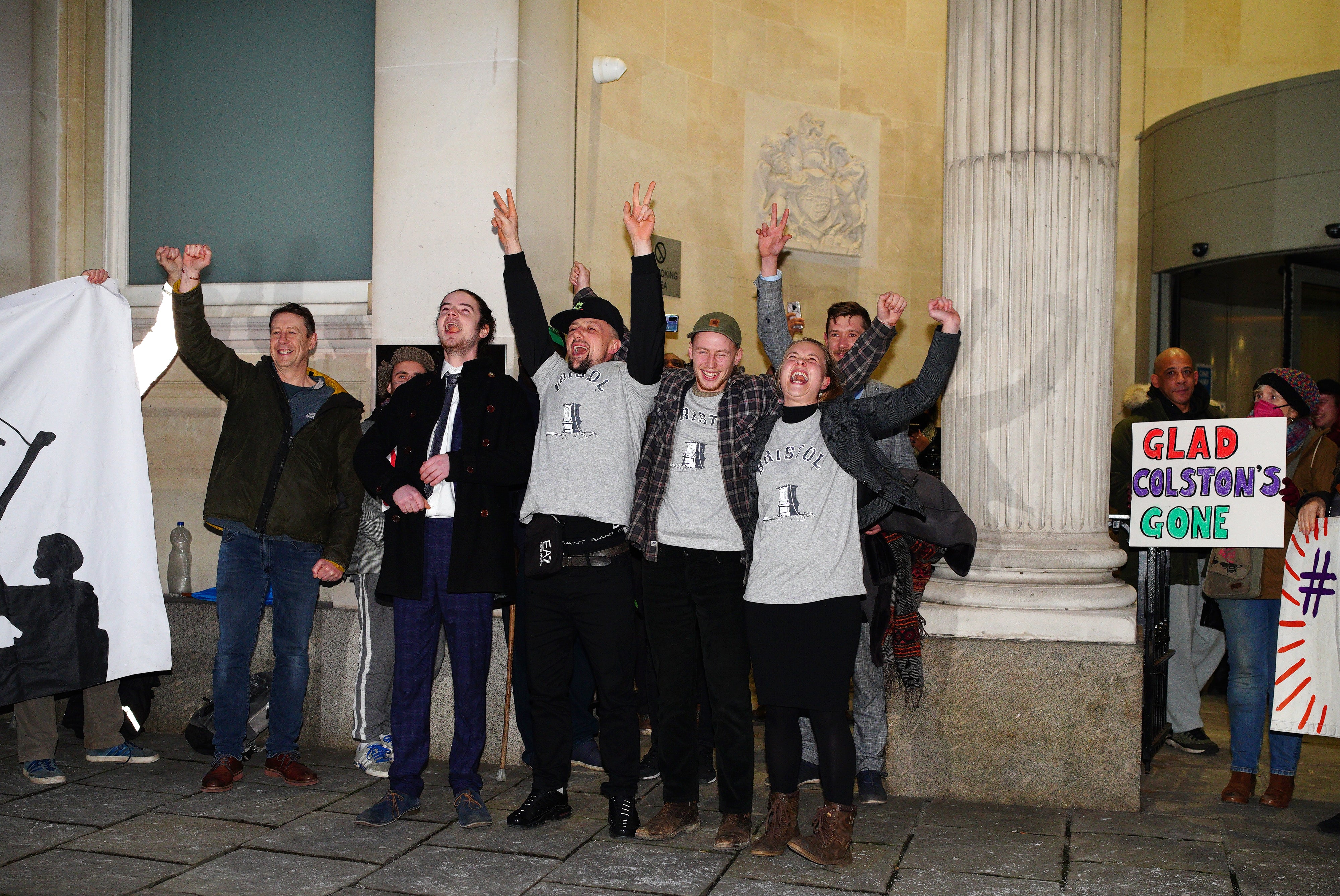Braverman under fire as she considers referring Colston case to Court of Appeal
The Attorney General said the verdict is causing ‘confusion’.

The Attorney General has come under fire after saying she is considering whether to refer the case of four people cleared of tearing down a statue of slave trader Edward Colston to the Court of Appeal.
Suella Braverman said the verdict is causing “confusion” and she is “carefully considering” whether to use powers which allow her to seek a review, so senior judges have the chance to “clarify the law for future cases”, despite insisting that a “trial by jury is an important guardian of liberty and must not be undermined”.
Some lawyers said the move smacked of “Trumpian politics” and described an apparent furore over the acquittals as a “complete waste of time” and damaging confidence in the justice system.
Opponents urged Ms Braverman not to “play political games when she doesn’t like the results”.
Without affecting the result of this case, as Attorney General I am able to refer matters to the Court of Appeal so that senior judges have the opportunity to clarify the law for future cases
Rhian Graham, 30, Milo Ponsford, 26, Sage Willoughby, 22, and Jake Skuse, 33, were prosecuted for pulling the statue down during a Black Lives Matter protest on June 7 2020 in Bristol, while a huge crowd was present.
They were acquitted by a jury at the city’s Crown Court on Wednesday.
The verdict prompted a debate about the criminal justice system after the defendants, dubbed the Colston Four, opted to stand trial in front of a jury and did not deny involvement in the incident.
Instead they claimed the presence of the statue was a hate crime and it was therefore not an offence to remove it.
The prosecution said it was “irrelevant” who Colston was and the case was one of straightforward criminal damage.
The acquittal cannot be overturned and the defendants cannot be retried without fresh evidence.
Nazir Afzal, a former chief crown prosecutor for the North West, told the PA news agency: “It’s a complete waste of time and damages confidence in the justice system.”
There are only two circumstances when a “jury verdict of not guilty is not the end of the matter”, he said – when a jury has been “tainted” through intimidation from gangsters, for example, or when there is “new, compelling evidence” that was not available at the time of trial.
“That only applies to cases such as homicides and serious sexual offences, not criminal damage,” he added.
Labour’s shadow attorney general Emily Thornberry said: “The Attorney General has a duty to uphold democracy, the rule of law and the sanctity of the jury system, not play political games when she doesn’t like the results.”
Barrister Raj Chada, who represented Mr Skuse, told PA: “It is a highly unusual move. I can think of no other example where it has happened and I am not sure what clarification the Attorney General is seeking.
“It really smacks of Trumpian politics.
“A decision that some in the Tory Party don’t like is being undermined and abused, so that it spreads cynicism about the system.
“And to think, but a few weeks ago, they were saying that juries were a fundamental part of our democracy.”
Last month Justice Secretary Dominic Raab set out plans for reform of human rights laws, including strengthening “quintessentially British traditions” like the right to a jury trial.
Section 36 of the Criminal Justice Act 1972 allows the Attorney General, following a submission from the Crown Prosecution Service (CPS), to ask a higher court to clarify a point of law but it is not a means of changing the outcome of an individual case.
A CPS spokesman said: “We are considering the outcome of the case but, under the law, the prosecution cannot appeal against a jury acquittal.”
The Attorney General’s Office said Ms Bravermen would be acting in her independent role as the “Guardian of Public Interest” if she did seek a review.
The powers, used infrequently, were most recently invoked in 2020 when she used them to establish it is not necessary in a sexual assault case for the prosecution to prove that the offender’s intent was sexual.
Human rights barrister Kirsty Brimelow, who is experienced in defending protest cases and is vice chairman of the Criminal Bar Association, said such powers to refer a point of law are “very rarely used” and there is “nothing of any surprise” in the legal directions of this trial.
Generally acquittals by juries are “respected”, Ms Brimelow said, adding: “Their right to return not guilty verdicts is a crucial part of a functioning criminal justice system. It is important that politicians do not interfere and certainly do not to appear to criticise a jury’s acquittal. We see how that turns out in repressive regimes around the world.”
During the trial, Judge Peter Blair QC told jurors they must decide the case on the basis of the evidence they had heard, after raising concerns in their absence that undue pressure was being placed on them by excessive rhetoric from defence barristers.
He also warned members of the defendants’ many supporters about their behaviour in court.
A petition calling for a retrial, claiming the acquittal set a “dangerous precedent that endangers all of our national heritage”, has so far attracted more than 15,000 signatures.
The concerns were echoed by some Tory MPs but others, including several lawyers, dismissed claims the verdict set a legal precedent which could give rise to other public monuments being defaced.
TV historian Professor David Olusoga, who gave expert evidence on the history of slavery for the defence at the trial, told Times Radio “respecting the decision of a jury is one of the traditions that people who claim to respect Britain and respect to our values are supposed to stand up for.”
